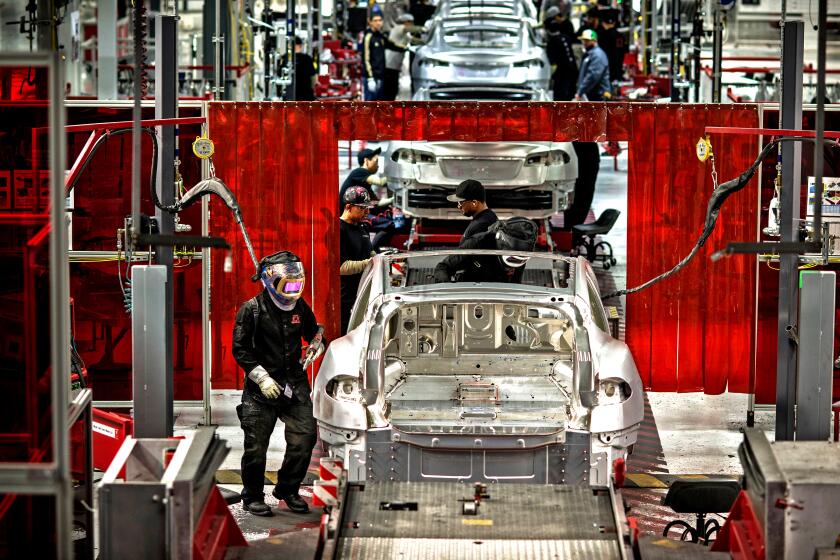Japan Begins Lifting Its Restrictions on Importation of Oil, Auto Parts
While the television cameras rolled, a nervous young Japanese gas station attendant got his 15 minutes of fame when he installed a Monroe shock absorber onto a Nissan Bluebird sedan. For that and other reasons, Japan’s service stations will never be the same.
The event, which took place at a JOMO station in suburban Tokyo, marked the first major inroad by a U.S. company into the Japan’s replacement auto parts market since the implementation last summer of controversial U.S.-Japan trade accords.
Illinois-based Tenneco Automotive predicts its business here will increase by 150% this year, thanks largely to a recent decision by Japan Energy Corp. to sell its Monroe, Rancho and Sensa-Trac shock absorbers and struts. Japan Energy plans to sell those products at 1,000 of its 6,400 JOMO stations by the end of 1997.
Trade politics gets some of the credit. As part of the auto trade pact, Japan removed shock absorbers, struts, power steering components and trailer hitches from a list of “critical parts” that in effect froze U.S. auto parts companies out of the market.
But that’s just part of the story.
Under pressure to remove burdensome regulations that have stifled Japan’s economic recovery and limited imports, the Japanese government is also undertaking deregulation of its heavily protected oil and gas markets.
Early this month, the government repealed a law preventing anyone other than refiners and distributors from importing oil to Japan.
That had kept such potential mega-buyers as airlines and trading companies from bringing in their own oil and left the market in the grateful grip of the oil industry. Now Japan’s oil market is open to any company willing to maintain sizable reserves and uphold strict quality standards.
For this import-dependent, energy-obsessed island--Japan produces no crude oil itself--the shift is dramatic. It reflects another crack in Japan Inc. as the country grudgingly opens itself up--to both foreign and home-grown competition--and begins scaling back the power of government bureaucracies over markets.
The new energy rules have thrown Japan’s oil industry, one of the nation’s most heavily protected sectors, into turmoil as the nation’s giant refineries and distributors face new competitors who are getting oil from new sources in Southeast Asia, instead of the long-favored Middle East, and selling it for less in Japan.
Japanese consumers are long accustomed to high prices at the pumps, largely a result of heavy energy taxes designed to discourage consumption. But the prices were further inflated by the closed market, and motorists here are already feeling some relief.
In anticipation of this month’s easing of import restrictions and the influx of cheaper oil, pump prices at gas stations were cut an average of 10% over the past year. Prices have edged up slightly in recent weeks, but oil industry officials estimate they have already lost nearly $3.7 billion in unrealized profit.
Major players like Japan Energy--a leading importer, refiner and retailer--are scrambling for ways to cut operating costs and increase traffic at their gas pumps. And giant discount grocery and dry-goods retailers Daiei and Jusco, as well as convenience store operators, are jumping into the gas-pumping business.
Daiei has formed a joint venture with Marubeni Corp., the giant Japanese trading company, which will bring in gasoline to sell in the parking lots at Daiei stores.
*
“We’d like to offer more convenience to the customer,” said Daiei spokesman Yoshihiro Yamaguchi.
At last week’s press conference at the JOMO gas station, Katsuya Yamamoto, senior managing director of Japan Energy, said his company must find new ways to attract customers to its pumps. Those include offering Tenneco auto parts, speedy oil changes and other auto repair services.
As with major U.S. gasoline chains, selling gas is no longer enough. Japan Energy formed a partnership with Arco, the Los Angeles-based oil company, and established 700 AM/PM convenience stores throughout Japan. It is pumping gas at 32 of them, with more to come.
“We are in a battle for our survival,” Yamamoto said.
In one of their most significant moves, these embattled Japanese oil companies are ending a tradition of subsidizing unprofitable gas stations. That has prompted predictions that up to half of Japan’s 60,000 service stations could go out of business within the next two years.
For 21-year-old gas station attendant Takeshi Aoki, this much-touted deregulation of the Japanese economy feels like economic strangulation.
“It is a severe situation now,” said Aoki, who works at a Chuo Shell Oil Co. station in suburban Tokyo, whose business has fallen off sharply because of the competition from newcomers.
*
The shock of the 1973 Arab oil embargo prompted the Japanese government to make energy conservation a national security issue and impose tight controls over its oil and gas markets. That included regulating imports, limiting the players, requiring the maintenance of large oil reserves and imposing price controls.
Since many Japanese depended on kerosene for heating and cooking, the government kept kerosene prices artificially low and let the oil companies make up the difference with higher profits on gasoline and diesel fuel. The government also imposed stiff taxes on gasoline, which remain in place and account for 56% the price motorists pay.
The high prices--currently about $3.80 a gallon, more than double what most Americans pay--encouraged the development of small, energy-efficient cars and the use of Japan’s efficient subway and railroad system.
*
“Gasoline in Japan is not an absolute necessity for everyday life,” explained Hiromi Yano, an official in the petroleum department of Japan’s Ministry of International Trade and Industry.
But priorities here have changed. The government has come under international pressure to open up its markets to foreigners.
Still, old habits are hard to break. When the first shipment of fuel permitted under the new, open rules arrived at Japanese docks this month, the subcontractor walked off the job, reportedly under pressure from a large refinery.
Itochu Corp., which had originally intended to offer the gas at a discount, ended up selling the entire shipment to Japan Energy.
(BEGIN TEXT OF INFOBOX / INFOGRAPHIC)
Who Guzzles
Not suprisingly, annual gasoline consumption per vehicle is relatively low in Japan, compared to some other countries. Annual usage, in gallons:
Venezuela: 1,445
Mexico: 690
United States: 591
Brazil: 358
Germany: 270
Japan: 199
France: 190
Sources: American Automobile Manufacturers Assn., U.S. Department of Commerce



